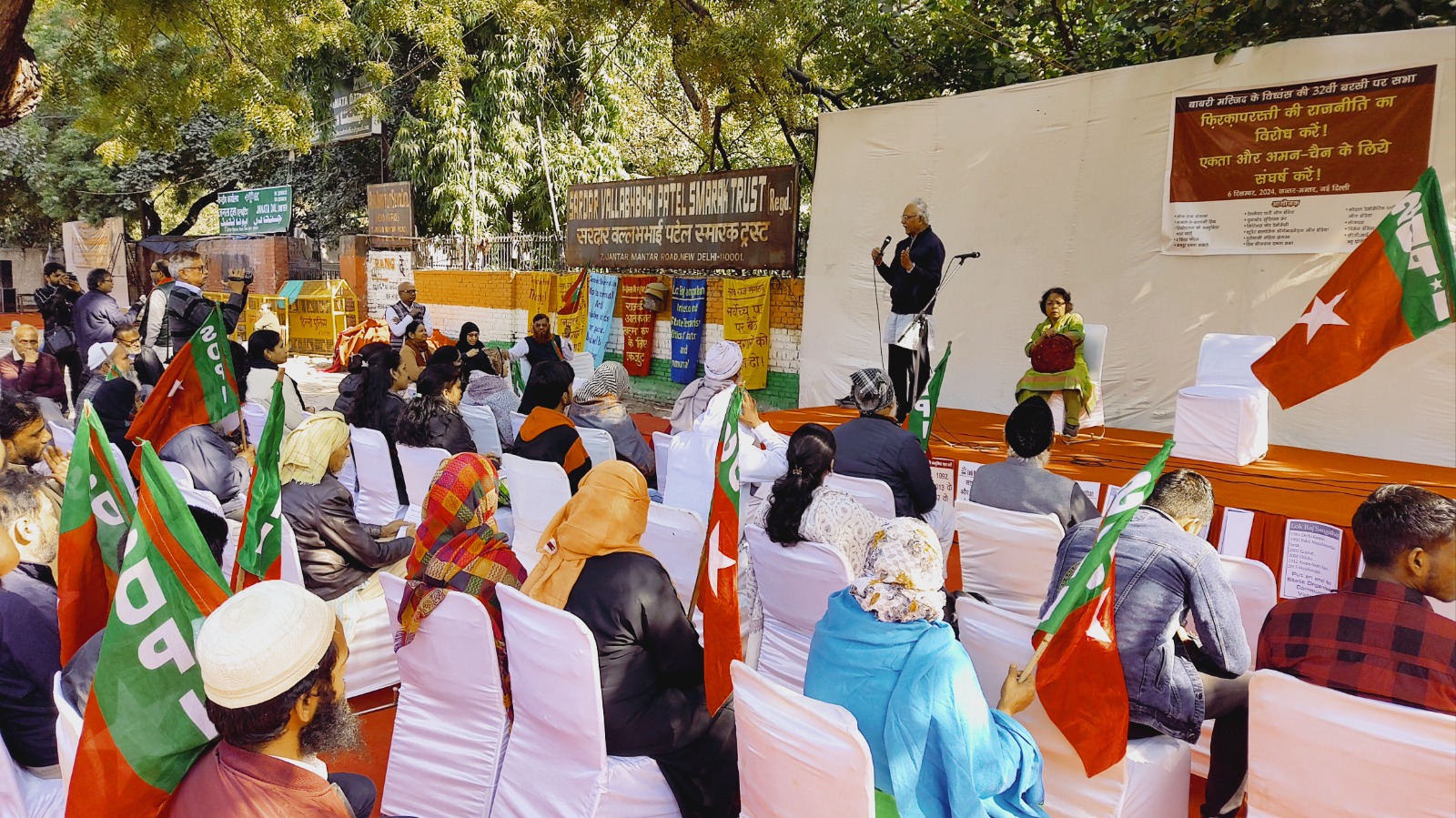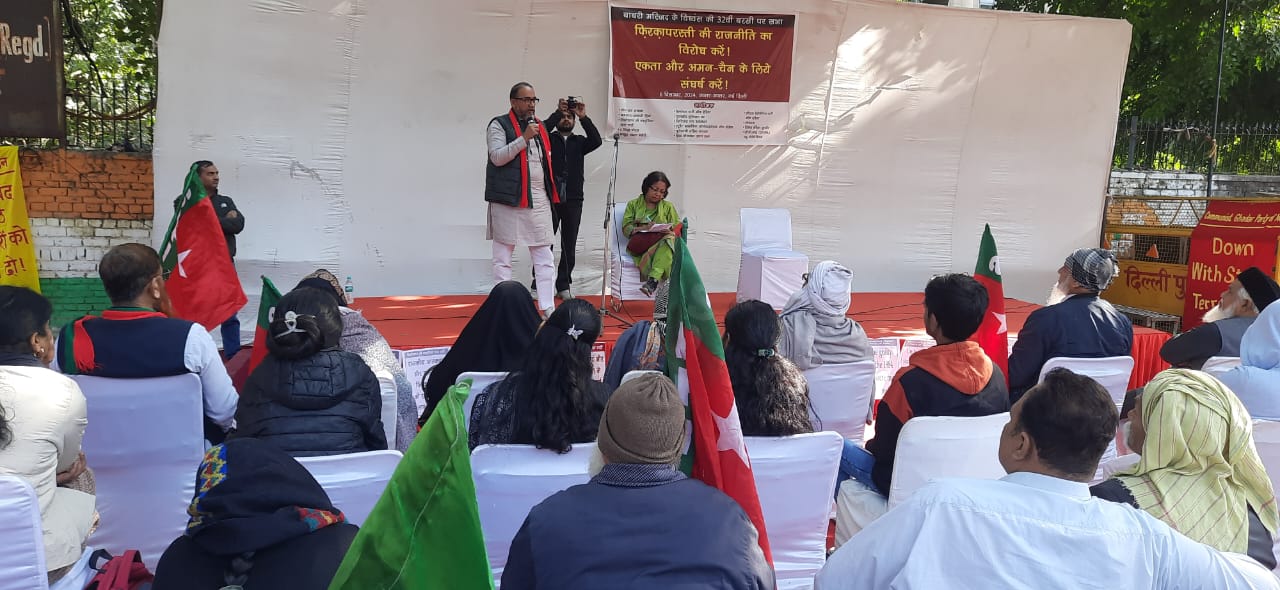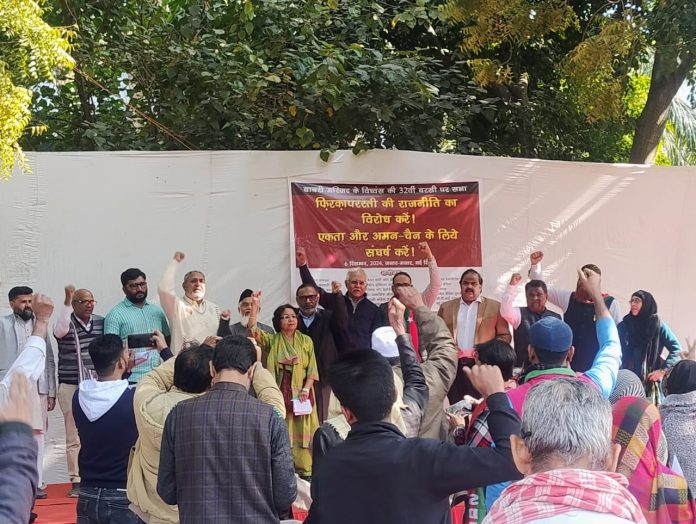– Abdul Bari Masoud
New Delhi: Marking the 32nd anniversary of Babri Masjid demolition, prominent leaders and activists gathered at Jantar Mantar to condemn the wave of litigation targeting ancient Muslim places of worship. They issued a stark warning, stating that such actions could have dire consequences for the nation’s social fabric. The speakers also criticised former Chief Justice DY Chandrachud for his controversial judgment permitting surveys of religious sites, allegedly in violation of Places of Worship Act, 1991, and contrary to his own Ayodhya verdict.
On December 6, 1992, the 400-year-old Babri Masjid in Ayodhya was razed by Hindutva radicals in broad daylight. This act, carried out under the watch of BJP leaders like LK Advani and Murli Manohar Joshi, remains one of the darkest chapters in independent India’s history. The demolition, seen as a deliberate assault on India’s secular fabric, was condemned as a criminal act by the Supreme Court, which clarified that the mosque was not built by destroying a temple.
 The protest, organised by Lok Raj Sangathan alongside other groups including SDPI, WPI, Communist Ghadar Party of India, Jamaat-e-Islami Hind, renewed demands for justice and an end to communal violence. Speakers emphasised the need to hold those responsible for the Babri Masjid demolition accountable and resist attempts to divide society along religious lines.
The protest, organised by Lok Raj Sangathan alongside other groups including SDPI, WPI, Communist Ghadar Party of India, Jamaat-e-Islami Hind, renewed demands for justice and an end to communal violence. Speakers emphasised the need to hold those responsible for the Babri Masjid demolition accountable and resist attempts to divide society along religious lines.
- Raghavan (Lok Raj Sangathan), Dr. Rais Uddin (WPI), Mohammed Shafi (SDPI), and Dr. SQR Ilyas (AIMPLB) highlighted the event’s long-term implications. They condemned the inaction of both the Congress-led government and state authorities during the 1992 demolition and criticised the 2019 Supreme Court verdict that legitimised the construction of a Ram temple on the mosque site.
 The Babri Masjid demolition was described as a premeditated act, orchestrated to polarise communities and distract from pressing issues like unemployment and poverty. Reports from the Liberhan Commission and Srikrishna Commission highlighted the complicity of political leaders from BJP, Congress, and Shiv Sena, none of whom have been held accountable even decades later.
The Babri Masjid demolition was described as a premeditated act, orchestrated to polarise communities and distract from pressing issues like unemployment and poverty. Reports from the Liberhan Commission and Srikrishna Commission highlighted the complicity of political leaders from BJP, Congress, and Shiv Sena, none of whom have been held accountable even decades later.
The ongoing litigations targeting other historic mosques, such as Gyanvapi in Varanasi and Shahi Idgah in Mathura, were deemed attempts to incite communal tensions. Recent police violence in Sambhal against protesters opposing such claims, which resulted in fatalities, was also condemned.
Speakers reaffirmed their commitment to a united struggle against communalism, emphasising the protection of all places of worship, irrespective of religion; the universal right to conscience and freedom of belief; and punishing those responsible for the Babri Masjid demolition and subsequent violence.
The gathering resolved to resist divisive politics and work towards a society based on justice, equality, and harmony. They accused the ruling party of using these litigations to distract from critical issues such as inflation, unemployment, and demands for a caste census.
The leaders called for unity against forces threatening India’s social fabric, urging citizens to stand firm against communal polarisation and uphold the principles of secularism and justice. The struggle, they said, is not only for the rights of Muslims but for the rights and dignity of all justice-loving people in the country.




